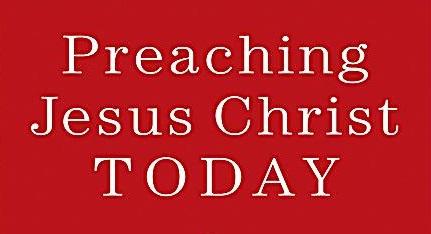Preaching Jesus Christ Today: Six Questions for Moving from Scripture to Sermon (Baker Academic, April 2018) is the newest book from Wycliffe College Chaplain and Professor of Pastoral Theology Annette Brownlee. The book approaches preaching as both a theological practice and a spiritual discipline. Stanley Hauerwas says, "I cannot imagine a better book for teaching seminarians not only the ‘what’ but also the ‘how’ of preaching." Annette (AB) responds to six questions about Preaching Jesus Christ Today, below.
Q: What is this book about?
AB: It’s a practical approach to preaching based on a theological interpretation of Scripture. The six questions try to “boil down” as simply as possible, the main questions that we ought to bring to our reading of Scripture in sermon preparation.
I locate Scripture within the church. The church is the soil in which Scripture, the preacher, and the listeners are all rooted. It’s almost an ecological argument. I develop the idea that the role of the preacher is three-fold: witness, confessor and theologian.
Q: Who is it for?
AB: It’s for pastors. It’s for those who have a commitment to preaching on Scripture. That commitment crosses denominations. It’s for those who are interested in exploring preaching as a theological practice. It’s evangelical and theological and practical all at the same time.
Q: Why this book, now?
AB: I work in a seminary, which prepares students to preach. And I’ve been preaching for 30 years. It doesn’t necessarily get easier. Here at Wycliffe, we’re an evangelical school, and our motto is “The Word endures,” but I’ve noticed that our students—right across denominations—often don’t know what to do with Scripture. Our students all hold Scripture with high authority, but that doesn’t mean they know what to do with it in a sermon.
Part of the answer to your “why now?” is our post-modern world. In a world of self-constructed and contested realities, the other person too often becomes a place of power struggle. Whose difference gets to be normative? Can I, as a white, educated woman speak for anyone else? Is my experience normative? Well of course not. But how can we negotiate all this? If we get rid of particularities, we get rid of our creaturliness, which is the heart of the incarnation. Jesus was born into a poor family, in a particular culture, he was a refugee, all of these are particulars. Our redemption is rooted in his embrace of our particularity. He descended to a place he did not belong, a place of enormous particularities. I’m trying to offer a way to preach the gospel of Jesus Christ that embraces our particularities because of Christ’s embrace of them.
Q: The book’s summary says that the six questions around which you frame preaching are meant to help preachers listen to Scripture and focus on what God does in the event of the sermon. What does God do?
AB: All of Scripture is God’s address, and the Holy Spirit uses that address to create a people who are able to hear God’s Word, to be formed by God’s Word and to receive an identity through it, which they live in the world for the sake of the world. Thus, in and through the Word, God does a lot! In other words, Scripture is not just about something. It does things! It creates listeners who are able to hear Scripture and it gives us an identity in Jesus Christ, which we live out in the world.
Q: How did working on this book change you?
AB: I think it’s made me a better preacher. It took me a long time to clarify in my own thinking the relationship between Scripture, the church, and the current age. What is the correlation between these old texts and us? What is the bridge between them? It took me a long time to think about how I understood that and the role of the preacher.
Q: What would you most like people to know about Preaching that you haven’t already mentioned?
AB: This is not a lofty, academic tome. It’s a good read. Each chapter is accessible.





